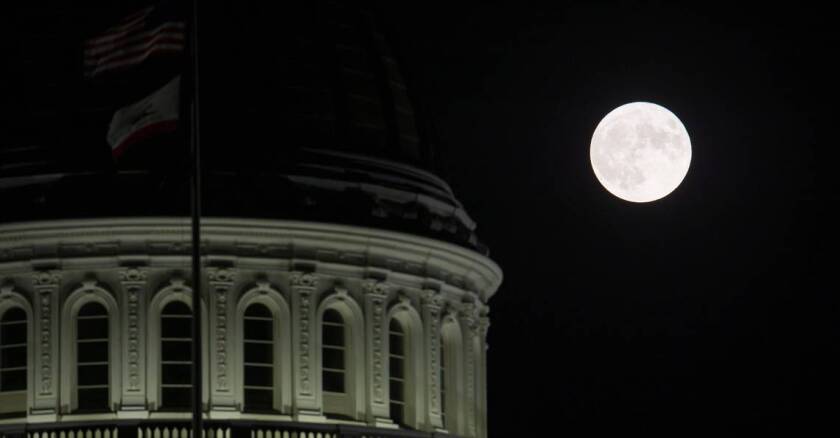The California Assembly voted 53-14 to give employees on strike access to state unemployment insurance benefits. The measure still needs the approval of the Senate labor committee, and then it must pass the Senate floor on a concurrence vote before it goes to Gov. Gavin Newsom’s desk.
Senate Bill 799, authored by Senator Anthony Portantino (D- Burbank), comes as tens of thousands of California workers, mostly in Los Angeles, walked off the job and onto the picket line during what some have called a “hot labor summer.”
Nearly 11,500 screenwriters represented by the Writers Guild of America have been on strike since May 2. Hundreds of thousands of actors represented by SAG-AFTRA joined them in solidarity in mid-July. Also in southern California, thousands of hotel workers walked out in early July, and Los Angeles municipal employees struck for a day in early August. The hotel workers even urged mega pop star Taylor Swift to reschedule her week of sold-out Eras Tour shows at SoFi Stadium in solidarity. (The shows went on as planned.)
“An employer shouldn’t be able to use deep desperation to force movement at the table,” said Lorena Gonzalez Fletcher, leader of the California Labor Federation, which is sponsoring the bill. “Just knowing that these workers won’t be prohibited from accessing a benefit that they’ve worked toward, that they deserve, that they’ve earned – that shows a great deal of respect for the worker.”
Members of the Assembly largely spoke in support of extending unemployment benefits to workers on strike. They set aside concerns about an indebted and poorly structured unemployment insurance fund that still owes the federal government at least $18 billion from COVID benefits. The independent Legislative Analyst’s Office estimates it will take until 2032 to fully pay back the loan.
“Let’s not take our concerns about EDD, about our funds, out on people who need the help right now,” said Assemblymember Laura Friedman (D- Glendale).
Friedman described Republican concerns that unemployment benefits would incentivize workers to strike as “really ludicrous” in her floor speech.
“This money is not going to pay people’s rent. It’s not going to put the food on their table,” she said. “It’s just going to help them not feel so desperate when they’re simply exercising their right.
Debate heated up when Assemblymember Bill Essayli, a Republican from Corona, made what were perceived as disparaging remarks about labor-friendly Democrats who accept union campaign contributions.
“Maybe there’s other labor unions that want to help (striking workers). They have plenty of money. We know that because they give it to you guys,” Essayli said, gesturing to fellow members on the Assembly floor. “Millions of dollars.”
Groans and eyerolls circulated through the chamber before Majority Leader Isaac Bryan, a Los Angeles Democrat, interrupted Essayli with a point of order.
“My colleague from Corona knows very well House Rule 108.1 states that he cannot disparage members or their intentions of this body by calling out members directly in such a disparaging way,” Bryan said. “I ask that he be admonished and reminded to keep his comments to the content of the bill.”
Essayli defended himself saying, “I didn’t disparage anyone. I’m just stating a fact.”
“My point is, there’s plenty of money that other labor unions have that they should step in to help their brothers and sisters,” Essayli continued. “I don’t think the taxpayers should.”
The California Chamber of Commerce, which lobbies on behalf of the business community, has led a staunch opposition to the bill. The group has labeled the bill a “job killer” and voiced concerns about increased taxes on California’s employers. The state’s unemployment insurance system is funded primarily by per-employee payroll taxes that employers pay to the federal government. The amount paid is calculated by taking a certain percentage of the first $7,000 that an employee earns in a calendar year.
“It’s still a job killer,” said Denise Davis, spokesperson for Cal Chamber. “We’re still opposed, and if it goes to the governor’s desk, we’ll be requesting a veto.”
“Striking workers have a job – they are just choosing not to work in order to create economic pressure and negotiate,” read an opposition letter from Cal Chamber, quoted in the Assembly’s floor analysis of the bill. “That is not the same as having no idea where your next paycheck comes from.”
Gonzalez Fletcher argued that the unemployment insurance fund has carried unfunded liabilities for years, and that organized labor wants to be part of the solution to restructure the fund.
“In the same way that we have structural liabilities with Social Security at the national level, you don’t keep people from accessing a benefit that they’ve earned because we’ve failed,” she said. “This has been an ongoing issue.”
The Senate labor committee will convene “at some point before Thursday at midnight,” according to committee staff. Then, the full Senate will need to take a concurrence vote, although Portantino’s staff did not know when exactly the vote would occur. Thursday, Sept. 14 is the last day for the Legislature to pass bills.
©2023 The Sacramento Bee. Distributed by Tribune Content Agency, LLC.












